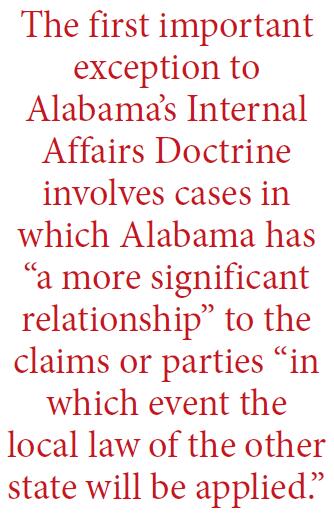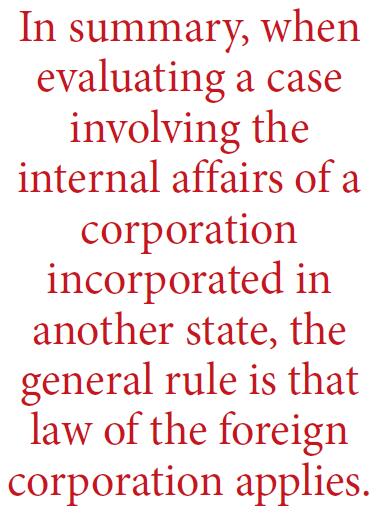Choice-of-law Issues in Shareholder Litigation Involving Alabama-based Corporations Organized Under the Laws of Other States
| Publication year | 2014 |
| Pages | 0173 |
| Citation | Vol. 75 No. 3 Pg. 0173 |

Imagine meeting someone for the first time. The stranger informs you that she is from Wilmington, Delaware. You ask her about the town and are surprised to learn that she has never actually been there and doesn't know of anyone who has. Despite her lack of contact with the state, she insists that she is a Delawarean. While this fact scenario would be unusual in the real world, it is very common in commercial litigation.
Many Alabama-based business entities are incorporated under the laws of other states, commonly Delaware, Nevada or Wyoming. These foreign business entities often have no contact with the state of incorporation beyond the incorporation itself. Most or all of the investors live in Alabama. In many circumstances, most of the companies' business is conducted in Alabama and the surrounding states. When a dispute arises among the shareholders or members of the company, the action giving rise to the dispute likely occurred in Alabama. This phenomenon is not unique to Alabama business entities. Indeed, the practice is so common that Delaware is home to more business entities than people.1
Litigation involving business entities incorporated in another state can involve complex choice-of-law issues. As a general rule, the liability of a business entity's directors, officers2 or majority shareholder3 to the minority shareholders or the company is determined by the law of the state of incorporation. This rule is commonly referred to as the "Internal Affairs Doctrine."4 Alabama courts traditionally apply the Internal Affairs Doctrine in cases affecting a plaintiff "solely in his capacity as a member of the corporation, whether it be as stockholder, director, president, or other officer, and is the act of the corporation whether acting in stockholder's meeting, or through its agents, [or] the board of directors . . . "5 Thus, in many shareholder and derivative suits, the law of the state of incorporation applies. Because of Delaware's position as a corporate haven, attorneys who frequently litigate commercial and derivative claims should invest in a good treatise of Delaware law, such as Jesse A. Finkelstein and R. Franklin Balotti's Delaware Law of Corporations & Business Organizations, to help navigate Delaware's well-developed law.
An excellent article concerning Alabama's Internal Affairs Doctrine and how it is applied appeared in this publication in March 2011.6 This article will not duplicate their work by addressing the general rule. Instead, this article examines the exceptions to the Internal Affairs Doctrine where Alabama law governs claims involving the internal affairs of a corporation incorporated in another state. The article then discusses examples to demonstrate how choice-of-law decisions are made in scenarios common in commercial litigation.
Under the Restatement (Second) Conflicts of Law-which Alabama courts follow on issues of director, officer and majority shareholder liability7 -there are two exceptions in which Alabama law applies to shareholder disputes involving corporations incorporated in a foreign state: (1) "in a situation where the corporation does all or nearly all, of its business and has most of its shareholders in that other state and has little contact, apart from the fact of its incorporation, with the state of incorporation;" and (2) where there is a directly "applicable local statute."8 This article examines each of these exceptions in turn.
The "More Significant Relationship" Exception to The Internal Affairs Doctrine

The first important exception to Alabama's Internal Affairs Doctrine involves cases in which Alabama has "a more significant relationship" to the claims or parties "in which event the local law of the other state will be applied."9 The Restatement discusses the scope of the exception in the comments. Comments c of §§ 306 and 309 state that the "local law of the state of incorporation will be applied" (1) "[i]n the absence of an applicable local statute" in the state of incorporation or (2) "in a situation where the corporation does all or nearly all of its business and has most of its shareholders in that other state and has little contact, apart from the fact of its incorporation, with the state of incorporation."10
It is important to note that the Restatement does not require that all, or even a majority, of a business entity's members or shareholders reside in Alabama for this exception to apply. The question the parties and the court should assess is whether Alabama's interest is sufficiently dominant to override the general rule which would cause Alabama law to apply. When considering whether Alabama has a sufficiently dominant interest which justifies applying Alabama law, the trial court should consider:
(1) the needs of the interstate and international systems; (2) the relevant policies of the forum; (3) the relevant policies of other interested states and the relative interests of those states in the determination of the particular issue; (4) the protection of justified expectations; (5) the basic policies underlying the particular field of law; (6) certainty, predictability and uniformity of result; and (7) ease in the determination and application of the law to be applied.11
Of these factors, the drafters of the Restatement consider the first, second, fourth, sixth and seventh factors to be the most important in determining choice of law questions in the realm of commercial litigation.12
To simplify the choice-of-law issues frequently encountered in commercial litigation, the Restatement provides two examples to illustrate the scope of the exception to the Internal Affairs Doctrine.
The Alpha Corporation is incorporated in Delaware. It does no business in Delaware and has few shareholders there. Majority Shareholder Bob is domiciled in Georgia along with most of Alpha's other shareholders. Bob would owe Minority Shareholder Carl-an Alabama resident-fiduciary duties under the laws of Alabama and Georgia but not under Delaware law. An Alabama court would be justified in applying Alabama law to fiduciary duty claims Carl brought against Bob because it would not be contrary to the policy of the states where Alpha does business and where the majority of its shareholders reside.13 By contrast, if Alpha did 20 percent of its business in Delaware, 40 percent in Alabama and 20 percent in Georgia with shareholders scattered throughout those states, Alabama's interest would not be sufficiently dominant to impose its law over Delaware law.14
While the Restatement is clear that it views this exception to be "the unusual case"15 and courts have described it as "narrowly drawn,"16 it is applicable in a significant amount of small business litigation in Alabama. Alabama is home to only a few publicly-traded corporations. Many of Alabama's closely held entities-even those registered in other states-do most or all of their business in Alabama. The owners of these businesses are Alabamians who may well have never even been to the state of incorporation. Under these circumstances, Alabama law should be applied to govern questions concerning an entity's internal affairs including:
• Who the shareholders of a corporation are;17
• The right of the shareholder to participate in the administration of the affairs of the corporation;18
• The right of the shareholder to participate in the division of profits;19
• The right of the shareholder to participate in the distribution of assets on dissolution and his rights on the issuance of new shares;20
• The right of a trustee to vote shares in a voting trust;21
• The liability and obligations of a majority shareholder to the corporation and to the minority shareholders;22 and
• The existence or extent of a director's or officer's liability to the shareholders or the corporation.23
This interpretation of the Internal Affairs Doctrine resolves the purportedly "contradictory" choice-of-law results found in two Alabama cases, Stroud v. John M. Cockerham & Assoc.,24 and Galbreath v. Scott.25 In Galbreath, the Alabama Supreme Court used Alabama law to determine the liability of a majority shareholder of a Florida corporation.26 In Stroud, under similar circumstances, the court applied Virginia law to determine liability.27 This "contradiction" was first identified by the Northern District of Alabama in In re Chalk Line.28 Some commenters have suggested that the attorneys in Galbreath simply failed to request the application of Florida law.29 While this is one plausible explanation, the results in Galbreath and Stroud may be resolved without that assumption.
The Stroud case involved a Virginia corporation-John M. Cockerham & Associates-with its principal place of business in Huntsville, Alabama. Public records indicate that the company maintained offices in Virginia and Alabama.30 While many shareholders lived in Alabama, others were geographically dispersed.31 John M. Cockerham & Associates did work for government entities with offices dispersed across the United States. Given this geographic diversity, an Alabama court should apply the law of the state of incorporation under the Internal Affairs Doctrine.32
By contrast, the Galbreath case involved a Florida corporation which held as its only asset "a lease to coal lands in DeKalb County, Alabama."33 The Florida company held no assets and conducted no business in Florida. There were only two shareholders, Louise Galbreath and H.K. Scott.34 Galbreath was a resident of Florida.35 Scott was a resident of Boaz, Alabama.36 Under the Restatement view, a trial court presented with these facts could correctly apply Alabama law given Alabama's sufficiently dominant interest in the relationship.37

In summary, when evaluating a case involving the internal...
To continue reading
Request your trial
